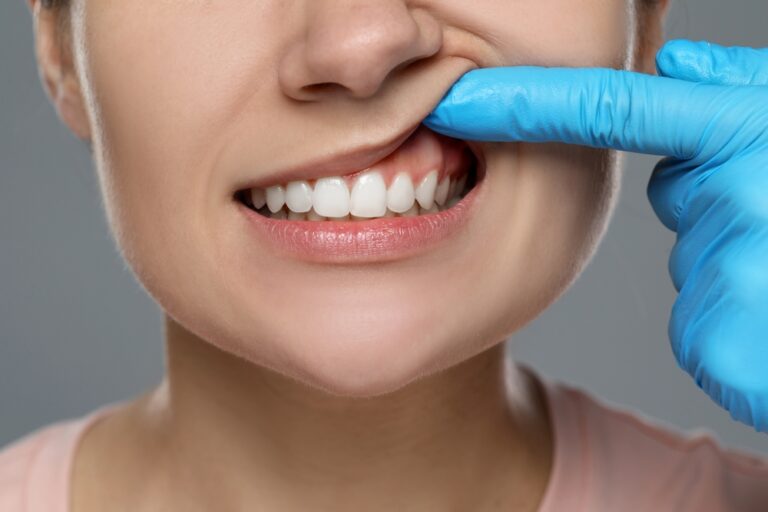Your mouth can be a major cause of concern when things are out of the norm. While pain is always unpreferred, teeth that continue to break are equally concerning.
Your teeth keep breaking because something has compromised their structure. This can be tied to poor genetics, poor oral care, or even previous dental treatments. It’s important to determine the cause and address the issue as quickly as possible.
We’ve compiled a list of the most common causes of broken teeth as well as how you may diagnose the issue. Communicating with your dentist is essential for a suitable outcome, but early intervention will prevent further damage.
Potential Causes of Broken Teeth
Teeth may break for a number of reasons, including:
- Clenching or grinding your teeth
- Poor oral care
- Tooth decay and/or gum disease
- Medication
- Overuse of fillings
- Genetics
- Dehydration or dry mouth
- Diet
- Age
In many cases, your teeth break because several of these factors are at play. It’s best to consult your dentist to determine the cause of the break and construct a plan to prevent future damage.
Grinding
Teeth grinding, known as Bruxism, is a common issue in adults that links directly to the weakening of teeth. Those with the problem may clench their teeth during the day when stressed or even unconsciously.
Sleep bruxism refers to grinding of teeth at night, and it’s not something that can be actively interrupted. As it continues, your teeth wear down the layers of those on the opposite jaw.
Your dentist can check your mouth and perform x-rays to look for wear patterns consistent with bruxism or similar issues. If this is the problem, they may fit you with a mouthguard to alleviate the effects and prevent further breakage.
Poor Oral Care
It can be hard to keep up with dental care habits, especially if you have mental blockages, but it’s important to brush and floss at least twice daily. Even just rinsing your mouth with water can do wonders to take care of the harmful bacteria brought on by food.
Poor oral hygiene allows the mouth to collect too much bad bacteria. In turn, the bacteria wears down your enamel and contributes to cavities and decay.
It’s also possible to clean your mouth too often or too aggressively. This harsh treatment may erode the enamel. Opt for a soft-bristle toothbrush, electric toothbrush with a pressure sensor, or a less abrasive toothpaste if this seems to be a problem.
Tooth Decay and Gum Disease
Tooth decay and gum disease can pop up for a number of reasons, including poor oral care and generics.
Decay sets in quickly after your enamel is compromised, exposing the weaker dentin the middle of your tooth. This layer is more porous and easily infected, and it can compromise your tooth structure from the inside out.
If left untreated, tooth decay can lead to more serious issues like gum disease. Gum disease may also occur unprompted, either due to genetics or another issue.
Gum disease attacks the structures that support your teeth. Once the bone and tissue are damaged, it opens the door for pockets to form between your gums and your teeth, pockets that may house harmful bacteria.
This is what leads to more serious cracks that span from root to tip.
Overuse of Fillings

Fillings are great in handling small cavities and imperfections, but too many may compromise the structure of your teeth. Fillings that cover a hole greater than 50 percent of your tooth are more likely to cause breakage down the line.
This is especially true for metal amalgam. Because they are made of a different material than your natural teeth, they respond differently to hot and cold temperatures. As they expand and contract at different rates, it puts abnormal pressure on your teeth and can cause breakage.
Your dentist may opt to replace the tooth with a crown or veneer if this is an issue.
Genetics
Like other health issues, you can inherit poor dental health genetically. This may affect the structure of your mouth as well as the strength of your teeth.
Two conditions to consider are dentinogenesis imperfecta (when the dentin doesn’t form correctly) and amelogenesis imperfecta (when the enamel doesn’t form correctly).
Medication
Similarly, the medication you take for certain health conditions can compromise the structure of your teeth. It’s worth double checking the side effects of anything that you’re currently taking.
Medication that makes it difficult to absorb calcium or medication that causes dry mouth is particularly problematic. It’s best to talk to your prescribing doctor about alternative doses, medications, and treatment strategies for your situation.
Dehydration or Dry Mouth
Saliva is essential in keeping your mouth moist and protecting against bacteria and its harmful effects. Not only is saliva antibacterial, but it works to neutralize acid from your meals until you can brush next.
Saliva also carries ions like calcium, fluoride, and phosphate, materials important for the remineralization of enamel.
When you’re dehydrated, your body cannot produce enough saliva to ward off harmful bacteria. Dry mouth may also occur without obvious cause, and you can use specialized mouthwash to combat the issue.
Diet
The food that you eat plays a major part in your overall health, and your teeth come in direct contact with every bite. You probably already know that sugary foods contribute to cavities, but they can also be the cause of cracks or chipping of your teeth.
Tooth enamel is weak against acidic foods as well. Some major culprits include:
- Citrus (lemons, oranges, grapefruit, and their juices)
- Wine
- Energy drinks
When you eat and don’t rinse your mouth, the leftover bacteria excretes acid that holds tight to the teeth and can create compromising cavities.
Eating hard foods like popcorn kernels or nuts can be too much for brittle teeth. All it takes is one bite, so be careful with what you snack on.
Age
Your teeth go through a lot as you age, including everything listed above. Eventually, they get to a point where they are simply weak because of your age.
This can also depend on how well you’ve taken care of them, but teeth rarely escape the effects of age. When it becomes a recurring issue, your dentist may recommend dentures or another whole-mouth replacement.
Types of Teeth Breaks
Teeth breaks are usually categorized as:
- Craze lines
- Fractured cusps
- Cracked teeth
- Split teeth
- Vertical root fractures
The way that your tooth breaks influences how your dentist will treat the issue.
Craze Lines
Craze lines are the most mild of breaks. They appear as tiny surface cracks, and they’re usually caused by:
- Grinding
- Chewing hard foods
- Uneven bites
- Nail biting
You may see thin, white lines on your enamel and not realize that they’re actually breaks because they’re unlikely to hurt. It’s still important to have them checked out. Your dentist will make sure they don’t extend to your dentin and offer cosmetic treatment.
Fractured Cusps
The next level of breakage is a fractured cusp, or a fracture in the biting area of your teeth. This may happen due to trauma, like a hit to the face, biting on something hard, a broken filling, or normal wear and tear.
While fractured cusps can be more sensitive, they’re not deep enough to harm the pulp of the tooth. Hot or cold foods may be more uncomfortable, but it’s not a show stopping pain.
A dentist often recommends a crown to cover the broken tooth and keep a cohesive appearance. If the pulp is exposed, a root canal may be necessary.
Cracked Teeth
A cracked tooth is one split from the surface to the nerve, but not so far that the tooth is split in two. This break can go to the root and pulp, and you want to treat the issue as soon as possible to protect what remains.
If the split reaches to the pulp, your dentist may need to perform a root canal to save the existing tooth. Cracks below the gumline may need to be extracted, although this depends on the location and the chances of success with other treatment options.
Split Teeth
A split tooth refers to one with a complete break. Because the vertical crack goes through the entire tooth, most are beyond repair and instead extracted to prevent further issues.
Some teeth, such as molars, are large enough that a section can be saved. Your dentist will extract the damaged side and do a root canal on the other side, covering the gap with a crown on the remaining section of tooth.
Vertical Root Fractures
Vertical root fractures aren’t usually painful. While they may cause root inflammation or infection, this only occurs after the break occurs and bacteria moves in.
Dentists may save the tooth with root canal or other endodontic surgery, but extraction is another possibility. These fractures are seemingly limited to teeth where root canals were previously performed.
Conclusion
While the list of reasons your teeth may break is extensive, you can usually look at your own history and habits to pinpoint the cause. Regardless of the issue, moving forward with proper oral care and a checkup with your dentist is essential.
If repeated breakage is a concern, your dentist will look for warning signs at every checkup. Cleanings will minimize bacteria that compromises the structure of your dentition.
Let us know if you have questions regarding your specific situation.






